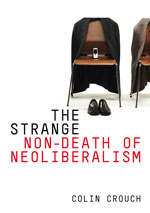 Colin Crouchpresents readers with a well-reasoned analysis of the financial crisis and economic developments in the West since the end of the ‘golden age’ thirty years ago, finds Steve Coulter.
Colin Crouchpresents readers with a well-reasoned analysis of the financial crisis and economic developments in the West since the end of the ‘golden age’ thirty years ago, finds Steve Coulter.

The Strange Non-Death of Neoliberalism. Colin Crouch. Polity. 2011.
How did neoliberal economic policies come to supplant the Keynesian welfare state in the 1990s? And, rather more surprisingly, how did neoliberalism survive what surely marks its apotheosis in the financial crisis and attendant recession of 2007-2010?
Colin Crouch is a leading political economist at Warwick Business School, and his eagerly-awaited new book offers a sweeping overview of economic developments in the West since the end of the post-war ‘golden age’ some thirty years ago. The Strange Non-Death of Neoliberalism has two main themes. First, it tracks the ideological battles between Keynes’ disciples, who used the levers of the State to deliver collective goals of greater equality, and the successors to this – the ‘neoliberals’, who colonised both right and left to pursue economic goals based on a far narrower conception of welfare and efficiency.
Springing from this, and providing the book’s other, bolder, thesis is the claim that the outcome of this battle has given us a politics, as well as an economics, dominated by large corporations. The growth of corporate power was a familiar complaint, even before the financial crisis, from assorted anti-globalisers who saw large, trans-national corporations as the incarnation of all evil.
 Crouch does not indulge in the conspiracy theories of the anti-globalisation Left, as he does not view big private companies as inherently malignant. But he does worry that existing analyses of the state-market nexus fail to appreciate how influential they are, an oversight which allows some big firms to get away with bad behaviour.
Crouch does not indulge in the conspiracy theories of the anti-globalisation Left, as he does not view big private companies as inherently malignant. But he does worry that existing analyses of the state-market nexus fail to appreciate how influential they are, an oversight which allows some big firms to get away with bad behaviour.
The key problem is that political and economic theorists often assume a neat dividing line between state and market. Big corporations upset this balance, however. They exist in the realm of markets, which they are frequently able to dominate because of their size. But they also use their importance in the economy and indirect leverage over growth and employment to manipulate politicians.
So long as the left-right divide was being played out through skirmishes between big-State, egalitarian Keynesians on one hand, and those favoring fluid, competitive markets guaranteed by legal statute on the other, there remained a clear ideological divide between government and the market and certain presumptions that individual firms should not be allowed to blur the line.
But the ‘Chicago School’ of economics changed all this. Chicago School economists, who achieved prominence in the 1970s, were ostensibly suspicious of all government interference in the market, even where this was directed at ensuring they remained competitive. Instead of insisting that efficient markets should comprise a large number of small firms, neoliberals of the Chicago School argued that the public interest could be better served by allowing a few large firms to gobble up the rest. Although consumer choice might thereby be diminished, the welfare of consumers overall could be enhanced by the efficiency gains that ensued. The owners (shareholders, who were themselves also consumers) in the dominant firms would benefit from these efficiency gains as well.
Crouch says this legitimised the emergence of a number of huge, transnational corporations which squashed the competition to shore up their own position. Chicago School dogma was swallowed by politicians of left and right and governments were thereby co-opted into underwriting their dominance. Democracy was damaged in the process.
Crouch has given us a well-reasoned and tightly argued analysis of our present predicament. Although written for the intelligent general reader, rather than subject specialists, his insights constantly provoke and illuminate. Far from being merely a dry dissection of neoliberal theory, the book also addresses how to make corporations behave better.
Crouch suggests beefing up corporate social responsibility, and using public pressure by consumers and shareholders to rein them in. To those who agree with his analysis of corporate power these solutions may seem weak – but then no one ever suggested sorting out the entanglement of corporate power and politics was going to be easy.
We may never achieve market perfection, or bring back the omnipotent welfare state. But by absorbing the warnings contained in this book we could perhaps hope to avoid a repeat of some of the worst mistakes of the last few years.
This review was originally published on the LSE British Politics and Policy blog on 11th September 2011.
——————————————————————————————-
Steve Coulter is Senior Economics and Business Analyst for BBC News, and writes regularly for the BBC News website on UK economic policy. He is also an Associate Fellow of the Social Market Foundation think tank and wrote the SMF’s recent paper on industrial policy, Manufacturing Prosperity. He is currently working on a project on the media’s coverage of the financial crisis with the Journalism School of City University. Steve received his PhD in European Political Economy from the LSE’s European Institute.






5 Comments